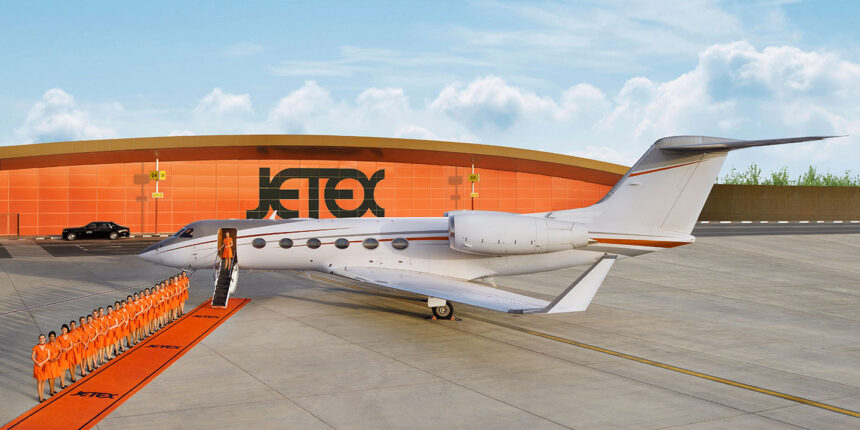Private aviation is undergoing a significant transformation, with a marked shift in passenger preferences toward larger jets and a growing emphasis on sustainable travel options. This trend, highlighted in a recent report by Dubai-based private aviation leader Jetex, signals exciting changes for the UAE’s aviation sector in the lead-up to 2025.
The surge in private jet travel, initially catalyzed by the global coronavirus pandemic, shows no signs of slowing down. Jetex, a prominent player in the industry, attributes its growth to an expansive global network and a flexible business model tailored to the evolving needs of high-net-worth individuals. The company’s private terminals, particularly the one in Dubai, have become luxurious destinations, often collaborating with prestigious brands to elevate the travel experience.
Passenger Demand Shifting Toward Larger Jets
According to Adel Mardini, founder and CEO of Jetex, passengers are increasingly prioritizing comfort and space, especially on long-haul international flights. This growing demand for more spacious cabins is expected to be met with the certification of new, large aircraft like the Bombardier Global 8000, which is slated for certification later this year, and the Falcon 10X, expected in 2027.
“Jetex guests are prioritizing space and comfort, focusing on the ability to work, relax, and connect with family or colleagues seamlessly while in the air,” Mardini explained. As private aviation evolves, larger jets will cater to these new preferences, offering more room for passengers to experience luxury and convenience during their travels.
Also Read: UAE Air Industry Soars with Etihad’s $14.5B Boeing Deal
The Emergence of Urban Air Mobility
In addition to larger jets, the UAE is preparing to lead the urban air mobility revolution. The country is rolling out next-generation air taxi services, supported by a regulatory framework designed to foster innovation in the sector. Jetex is positioning itself at the forefront of this revolution, with plans to ensure its private terminals are ready to accommodate electric vertical takeoff and landing (eVTOL) aircraft once they are launched.
Jetex is also assembling specialized operational support teams to facilitate the integration of air taxis into the UAE’s transportation network. With its supportive regulatory environment and strategic partnerships, the UAE is set to be a key player in the future of urban air mobility.
Private Aviation Beyond the Ultra-Wealthy
While Jetex’s clientele has long included international celebrities, business moguls, and athletes, Mardini notes that the core drivers of the private aviation boom are now extending beyond the ultra-wealthy. More families and individuals are opting for private jets for leisure travel, seeking convenience, safety, and access to destinations that are less accessible via commercial air travel.
“Private jets are becoming an appealing option for families and individuals who value the ability to travel to remote locations and avoid the uncertainties and crowds of commercial flights,” Mardini said. As the global business jet market is projected to exceed $113 billion by 2030, Jetex aims to solidify its position as a leading force in this expanding industry by capitalizing on the trends of larger, more sustainable aircraft and urban air mobility.
Strategic Partnerships Fuel Jetex’s Growth
Jetex has built a strong brand presence, thanks in part to its loyal patrons, including international celebrities, athletes, and business leaders. Mardini emphasized that while the company has remained selective about its media presence, the support of its celebrity clientele has helped Jetex maintain its visibility on global platforms.
“We are very selective in terms of our media presence. Several global celebrities approached us in the past, but we wanted to ensure that Jetex remained a global brand with universal appeal,” Mardini explained. The company’s involvement in supporting international soccer teams during the World Cup, as well as flying celebrities worldwide, has further strengthened its reputation as a premium aviation service provider.
Also Read: Digital Travel Credentials: The Beginning of a New Age in Aviation
Meeting the Evolving Needs of a Diverse Clientele
The private aviation industry continues to evolve to meet the needs of a broader clientele. While business and corporate travel remain significant drivers, the growing trend of families and individuals opting for private jets for leisure purposes is reshaping the sector. Private aviation is no longer solely about corporate privacy and security; it has become a preferred mode of travel for those seeking convenience, safety, and time efficiency.
“It’s about creating an experience that prioritizes convenience, safety, and time efficiency,” Mardini said, highlighting the shift in consumer preferences and the increasing demand for a seamless, luxurious travel experience.
Conclusion
As the UAE’s private aviation sector prepares for the arrival of larger jets and air taxis, Jetex is poised to play a key role in shaping the future of air travel in the region. With its innovative approach to luxury aviation and a commitment to meeting the evolving needs of its clientele, Jetex is well-positioned to maintain its leadership in the UAE’s dynamic private aviation landscape.
Click Here for more business news.






